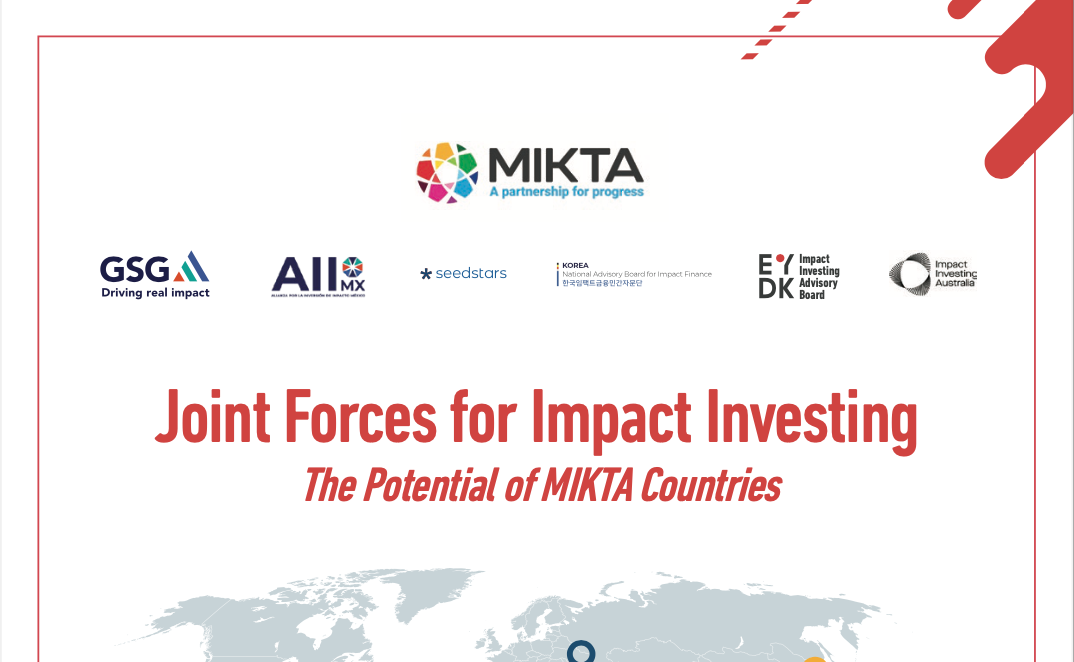
The potential for impact investing in MIKTA (Mexico-Indonesia-Republic of Korea-Türkiye-Australia) countries.
New study shows steady growth of European impact investments, but more acceleration is needed
Brussels/London, 1 December 2022 –European impact investments are growing, but not quickly enough to deliver on the Sustainable Development Goals by 2030.
This is the main finding of a report released today by EVPA – the European investing for impact network and the Global Steering Group for Impact Investment (GSG) on the impact investment market in Europe.
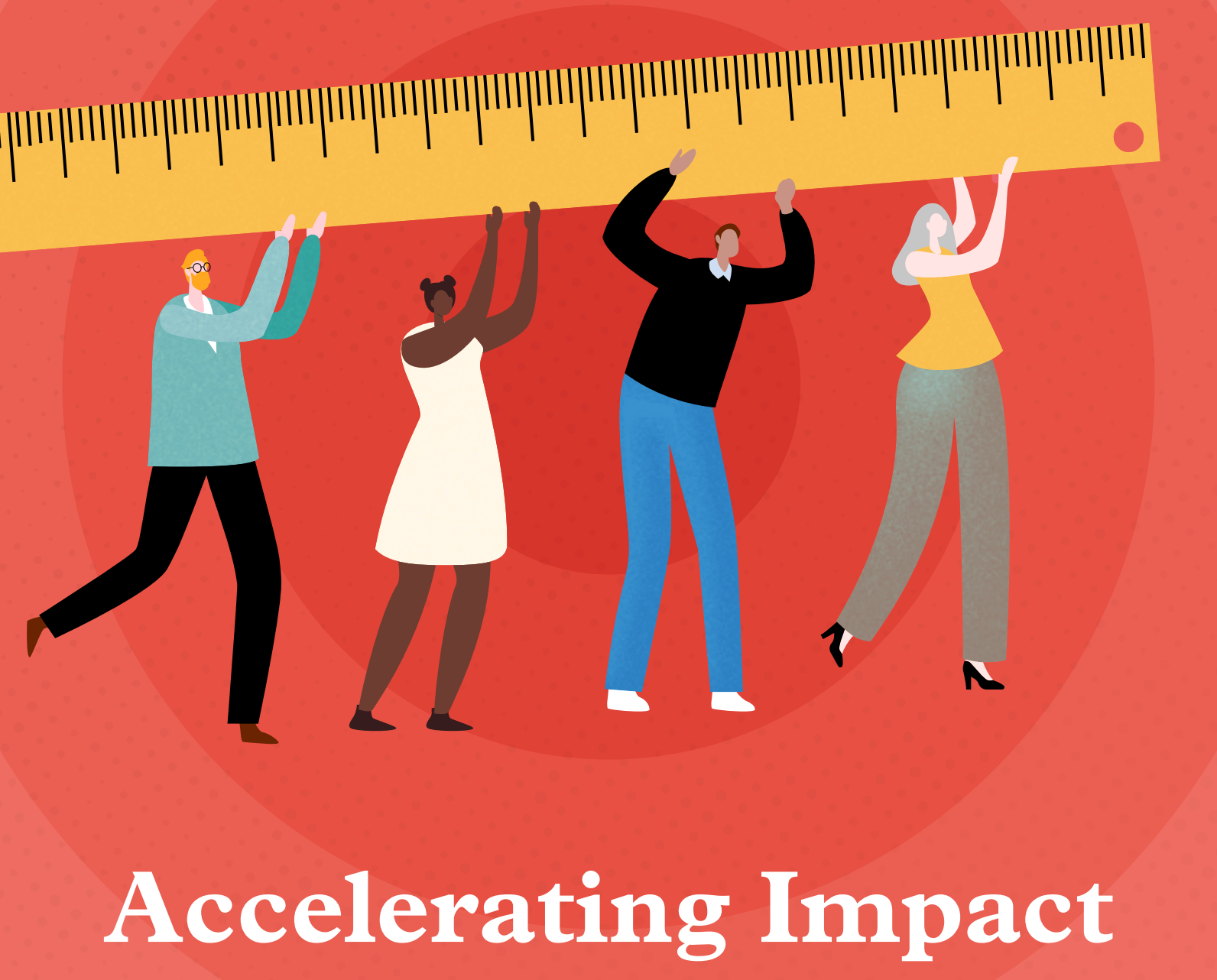
The study estimates the European direct impact investment market – i.e. investments directly made into enterprises addressing social and environmental challenges – at € 80 billion. European impact investment assets under management grew by a substantial 26% from 2020 to 2021, but still represent only 0.5% of the European mainstream investment market.
The top areas covered – decent work and economic growth, reduced inequalities and climate action – include a mix of social and environmental goals, which shows how impact investors represent a force for change on both impact categories.
Looking at the sources of funding for impact investment, more than a quarter comes from individual investors. This trend is driven by countries with favourable regulations, which have proven to democratise access to impact investment and mobilise significant resources from retail investors, who are increasingly demanding sustainable and impact opportunities. This indicates that policy makers – both national and European – have a key role to play in making access to funding for retail investors easier.
At the low end of the spectrum, foundations’ endowment assets and high net worth individuals represent an untapped potential of resources which could be mobilised to support impact funds. EU funding accounts for 5% of the funding available to impact investors. This is heading in a positive direction, growing from 1% in 2020, and reflects the increased engagement of the European Investment Fund to deploy EU funds into public-private co-investments.
“The continued growth in the European impact investment market is encouraging. But we urgently need greater acceleration to address today’s pressing social and environmental needs”, said Roberta Bosurgi, EVPA CEO. “This is a wake-up call to all investors: we need more impact investments that identify, nurture and take big risks for innovative solutions to complex social and environmental challenges – from the climate crisis to sustainable food systems.”
“This coordinated cross-border market size study is important for attracting more capital providers and mobilising more capital for impact investment in European countries,” said Cliff Prior, the CEO of GSG. “The open-source transparency and detail in the report provides valuable data to investors and governments and will support future impact growth in the region.”
This report is the result of the first harmonised European impact investment market sizing, a joint effort by EVPA and GSG, as well as several of GSG’s National Advisory Boards and their academic partners. It will help create more transparency around impact investing trends and practices, and quantify their transformative impact on society and planet. It also allows for an aligned, credible and recognised baseline across Europe against which to measure progress. This is a critical first step to mobilise more capital providers interested in playing a bigger role in the impact space.
For more information and interview requests, contact:
Georgina Siklossy, EVPA Communications & Partnerships Manager
Email: gsiklossy@evpa.ngo
Notes to editors:
- The study includes 285 organisations, representing 512 impact investment vehicles from 18 European countries. Venture capital and private equity impact funds represent over a third of the organisations active in the impact ecosystem (36%), followed by financial institutions (20%) and foundations (10%). Together, these first three categories correspond to two thirds of the sample; the remaining third is made of 10+ different categories of respondents.
- The report was launched at the EVPA Impact Week, which gathers 800+ impact leaders in Brussels to accelerate positive change for people and planet
About EVPA
EVPA, the European investing for impact community, is a unique network at the intersection of business and purpose, driven by knowledge and focused on impact. We rally people, capital, knowledge, and data to catalyse, innovate and scale impact. EVPA brings together a diverse group of capital providers (impact funds, corporations, foundations, private equity, banks, public funders) and social innovators of all sorts – from household names to emerging new players. Together we work to increase prosperity and social progress for all, fix inequalities and injustices and preserve the planet.
About GSG
The Global Steering Group for Impact Investment (GSG) is an independent global steering group promoting sustainable development and advancing education in impact investment. The GSG was established in 2015 as the successor to, and incorporating the work of, the Social Impact Investment Taskforce established under the UK’s presidency of the G8. The GSG’s National Advisory Boards (NABs) currently cover 35 countries. The GSG brings together leaders from finance, business, philanthropy and governments to drive a shift towards impact economies. Follow the GSG on LinkedIn and Twitter.

Upgrading living conditions for 1 billion people in the Global South critical to meeting the SDGs
LONDON – Impact-led Investment of $6 trillion is needed to lift over 1 billion people out of slum conditions across the Global South. Doing so will represent an essential step towards the world achieving the SDGs by 2030, according to the GSG’s latest report entitled “Informal Settlements: No Longer Invisible”.
Despite the urgent need for investment, public funds alone are woefully insufficient to address the requirements for upgrading slums. Furthermore, informal settlement investments have been largely overlooked by investors, who have been focused on other pressing themes such as education, access to healthcare or agriculture.
The GSG’s Informal Settlements report makes the case for prioritising urban slums as a core area for impact investment and development. It outlines how improving the places in which people live can have multiple benefits for public health, education and economic opportunities, making addressing informal settlements central to achieving the SDGs. The report also identifies private capital structures, as well as the cooperation between investors, government bodies and other stakeholder groups, needed to draw in impact investment.
Around the world, one in eight people live in informal urban settlements without proper access to drinking water, sanitation or electricity. The issue is widespread and acute with 55% of the urban population of Zambia living in slum areas, along with some 48% of the urban population in Bangladesh, and 28% in Colombia.
In addition to poor housing without basic utilities, the precarious and often illegal nature of slum developments means that many inhabitants cannot access education, healthcare, the labour market or financial services. Death rates among infants and children are higher than for other urban groups, there is greater risk of respiratory infection, and inhabitants are more affected by the effects of climate change, such as flooding in low-lying areas.
“The impacts of slum-upgrading programmes and projects reach far beyond providing much needed basic infrastructure; they improve living conditions, public health and educational outcomes, and stimulate local economies by boosting quality job creation,” said Sir Ronald Cohen, the GSG’s Chair.
“By shining a light on informal settlements, our aim is to spur the creation of financial vehicles and solutions that both help to address many of the complex issues slum-dwellers face, while offering purpose-driven investors the opportunity to deliver impact at scale and meet their financial return objectives,” Cohen added.
The GSG highlights the potential to adapt existing financing instruments, including Green, Social, Sustainability and Sustainable-Linked Bonds to channel private capital investment into informal settlements. Over $1 trillion was raised across such instruments in 2021, which Moody’s ESG Solutions forecasts will increase to $1.35 trillion in 2022.
The report also draws attention to the often-sizeable informal economies in slums. A 2020 study by the Data Favela Institute and Locomotiva Institute found that residents of Brazilian favelas had a combined purchasing power of almost $28 billion, more than the annual GDP of Cambodia or El Salvador. If this economic strength is recognised – and potentially guaranteed by governments – it could be mobilised to help pay returns, creating a win-win-win for communities, investors and society at large.
The GSG makes a number of recommendations for investors, governments and other stakeholders to prioritise and drive investment into informal settlement upgrades. These include:
- For investors to look beyond thematic approaches in areas like healthcare and education at place-based solutions and multi-dimensional strategies
- For governments to make tackling informal settlements a priority and find solutions to de-risk investments for investors
- For urban planners and habitat experts to acknowledge and understand the role that private investment can have in upgrading urban areas
- All stakeholders to recognise the need to place communities at the heart of projects, involving resident and giving them a sense of ownership.
In short, the report calls on all parties to no longer view slums and their inhabitants as a problem, but to acknowledge the potential in transforming urban liabilities into assets. The GSG aims to stimulate an action-oriented conversation that will lead to the creation of scalable solutions that will address a global challenge affecting over a billion people, and ultimately help deliver the SDGs.
Please click here to download the Informal Settlements: No Longer Visible report.
ENDS//
Notes to editors
For media enquiries, please contact:
Lynn Nicholson, Chief Communications Officer, The Global Steering Group for Impact Investment – lynn.nicholson@gsgii.org
Mobile: +32 494 813 837
About the Global Steering Group for Impact Investment (GSG)
The Global Steering Group for Impact Investment (GSG) is an independent global steering group promoting sustainable development and advancing education in impact investment. The GSG was established in 2015 as the successor to, and incorporating the work of, the Social Impact Investment Taskforce established under the UK’s presidency of the G8. The GSG’s National Advisory Boards (NABs) currently cover 35 countries. The GSG brings together leaders from finance, business, philanthropy and governments to drive a shift towards impact economies. For more information visit www.gsgii.org and follow the GSG on and follow the GSG on and follow the GSG on Twitter and LinkedIn.
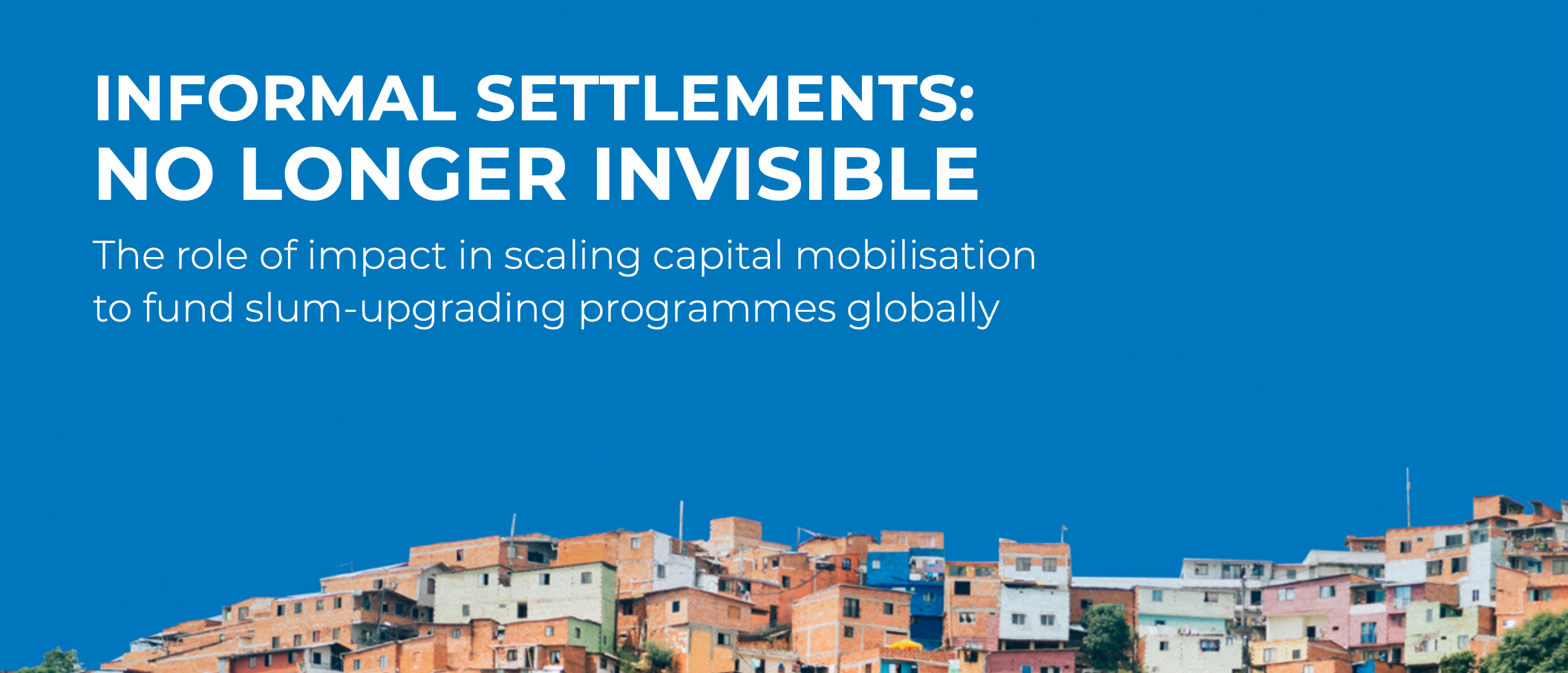
The role of impact in scaling capital mobilisation to fund slum-upgrading programmes globally.
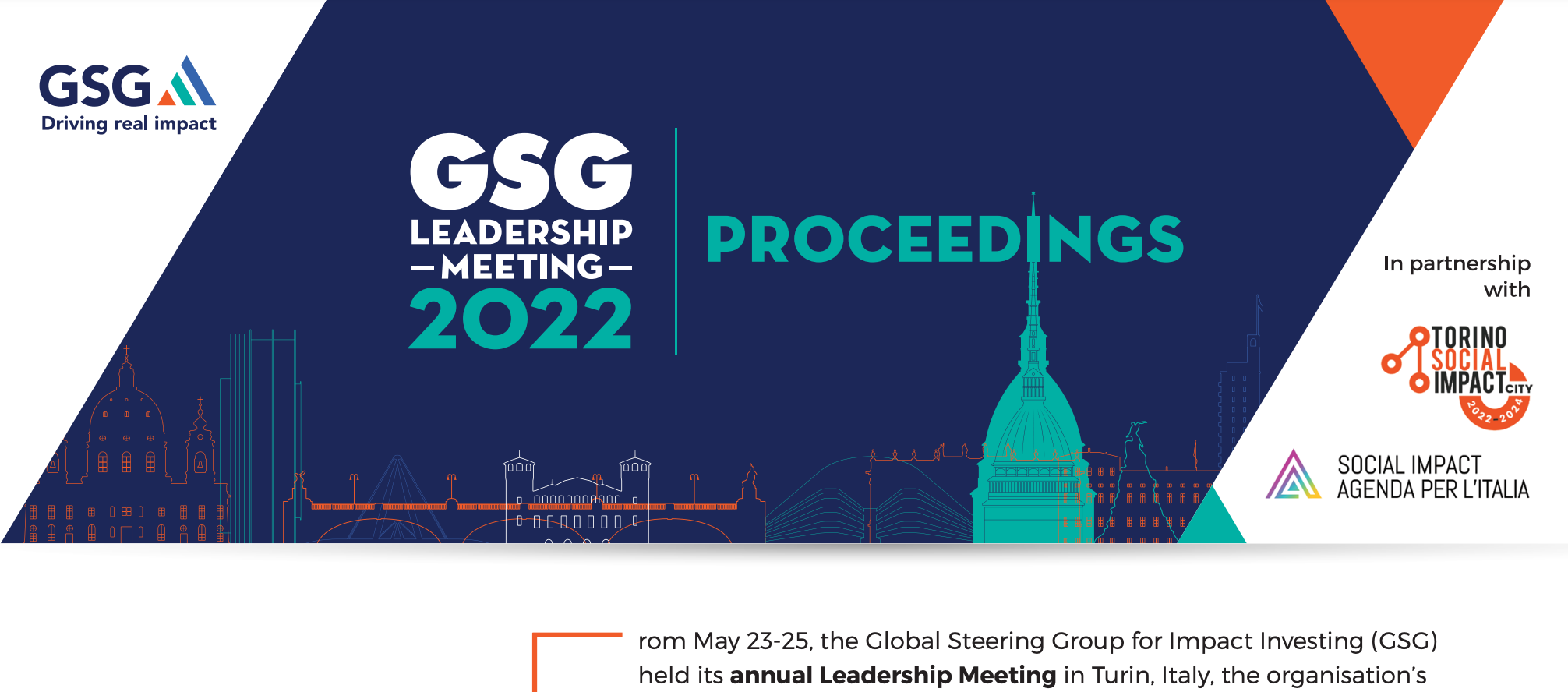
From May 23-25, the Global Steering Group for Impact Investing (GSG) held its annual Leadership Meeting in Turin, Italy, the organisation’s first in-person meeting since the start of COVID-19. The meeting included more than 140 leaders from over 51 countries who came together to reflect on progress with regard to ecosystem building, co-create solutions to current challenges and priority areas, and identify ways to achieve our vision.
The Impact Taskforce (ITF)
Established under the 2021 UK Presidency of the G7
Open letter from the ITF Chair
Progress update – June 2022
Background
In June 2021, 120 leaders from the worlds of investment, finance, government and international organisations, came together as an industry-led Taskforce under the auspices of the UK Presidency of the G7 to help answer a critical question for our time: “How can we accelerate the volume and effectiveness of private capital seeking to have a positive social and environmental impact?”
In just over four months, the Impact Taskforce (ITF) launched a series of ambitious, yet concrete and actionable recommendations to i) help transform the quality and transparency of information on the impact of investment decisions, and ii) scale mobilisation of institutional capital for positive impact, especially in emerging markets through vehicles that integrate social and environmental objectives in support of the United Nations’ Sustainable Development Goals (SDGs) and a just transition that does not leave people and places behind.
At all times we were conscious that success was not the publication of a series of reports, but to engage top decision-makers around our specific recommendations, obtaining a sustained commitment to the mobilisation of private capital for public good and seeing intermediate milestones achieved.
Six months after our launch, we are particularly encouraged by developments that directly take forward key recommendations made by the Taskforce. On the impact transparency front, this includes initial drafts and proposals by the IFRS´s International Sustainability Standards Board (ISSB), the US Securities and Exchange Commission (SEC) and the EU´s European Financial Reporting Advisory Group (EFRAG) to advance climate and sustainability reporting standards. On impact capital mobilisation, we welcome the launch of the Just Transition Finance Challenge, a new coalition of investors heeding our call to launch more financing vehicles that deliver a global, fair and inclusive transition to Net Zero.
Whilst we commend stakeholders, including ITF members and third parties, for making real progress on a number of additional fronts, we also call for faster movement in areas where action is lagging behind.
Progress on the ITF Recommendations
In the field of impact transparency (our Workstream A), back in December 2021 we called on a wide range of stakeholders, from regulators and standard setters to investors and companies to work towards a future in which investment decisions, by companies and institutional investors are increasingly taken through the triple lens of risk, return and impact. In particular, we i) called on governments to support and participate in upcoming consultations by the IFRS´ International Sustainability Standards Board, ii) called for an urgent “build” on the ISSB´s reporting “baseline” to include any impacts on all stakeholders, iii) defined mandatory accounting for impact as a destination, and iv) recommended that the G7 countries and partners collaborate with the private sector, standard-setters and academia on approaches to impact valuation.
In the light of these recommendations, over the past six months we were encouraged by:
- The appointment of ITF Steering Committee member Emmanuel Faber as Chair of the IFRS´ International Sustainability Standards Board (ISSB), mandated with the crucial mission of establishing a “comprehensive global baseline of sustainability-related disclosure standards that provide investors and other capital market participants with information about companies’ sustainability-related risks and opportunities to help them make informed decisions”. In just a few months, the ISSB published exposure drafts on Sustainability and Climate-related disclosures, opening a public consultation process ending on 29 July, 2022. We urge governments, industry bodies, standard-setters and other relevant stakeholders to support and engage closely with this process, taking into account the ITF recommendations to achieve standards that are truly globally relevant by, i) balancing social and environmental issues; ii) acknowledging and reflecting realities of both emerging and developed economies; iii) actively engaging small and medium enterprises (SMEs) along the value chain; and iv) putting forward an assurance regime for all data relevant to enterprise value for public companies.
- Proposals by the US Securities and Exchange Commission (SEC) to introduce changes that “would require registrants to include certain climate-related disclosures in their registration statements and periodic reports, including information about climate-related risks that are reasonably likely to have a material impact on their business, results of operations, or financial condition, and certain climate-related financial statement metrics in a note to their audited financial statements”
- The first reports (of a series of seven) by the European Financial Reporting Advisory Group (EFRAG), to advance corporate sustainability reporting across the EU. EFRAG recognises the importance of coordinating the development of EU sustainability reporting standards with existing and emerging global initiatives, which we deem imperative to advance towards a global baseline that is widely adaptable across the globe, in both developed and emerging markets.
- Continuing progress in the field of impact valuation, through the recent collaboration announcement by the Value Balancing Alliance (VBA) and the Impact-Weighted Accounts Project at Harvard Business School (HBS IWA) to harmonise methodologies on impact accounting, as well as emerging efforts by the Capitals Coalition to establish a global Value Commission to “set international rules for how ‘value factors’ are created and used by organisations around the world.”
Strong and sustained progress on the impact transparency and integrity agenda will continue to be crucial to address emerging concerns across a number of jurisdictions, including with respect to ESG disclosure and the current lack of clear, consistent and standardised reporting mechanisms. Current controversy and confusion amongst some market participants should be seen as both a sign of relevance of the impact transparency and integrity agenda, as well as a clear call to provide high quality data to all stakeholders, making our work and recommendations, as well as the goals of the ISSB and similar efforts, more important than ever.
In relation to the mobilisation of capital for positive impact at scale (our Workstream B), at the moment of its launch, the ITF i) urged coordinated movement spearheaded by the G7 to remove multiple external and internal barriers that currently limit the flow of institutional investors’ transformational capital particularly to emerging and frontier economies, ii) recognised the need for integration of environmental and social factors to drive an inclusive, fair, and equitable transition to net zero economies, iii) called on multilateral development banks (MDBs) and development finance institutions (DFIs) to support for the mobilisation of capital, by more actively using a range of proven tools and instruments and improving frameworks for sustainable investment that currently constrain deployment, and iv) urged an expansion of capabilities and increase in transparency to support the deployment of funds to people and places of greatest need and opportunity.
Since we launched in December 2021, global events have made the financing challenge even bigger and the relevance of our positive impact agenda even greater. Again, we see some positive progress against a background of increasing urgency. The widespread consequences of the Russian war on Ukraine, including disruptions to the world´s food and fuel markets and economic volatility including rising inflation, is dangerously increasing uncertainty and challenging social stability across developed, middle income and emerging markets – as, according to the UN, 1.7bn people will be exposed to disruptions leading to poverty and hunger, 500k people are currently in famine (a 500% increase from 2016) and over 250m are at hunger level (doubled since start of Covid).
This reinforces in our mind the importance of the impact agenda, and our specific recommendations to boost private investment in emerging economies by dismantling barriers and providing incentives.
Over the past six months:
- We were particularly encouraged that leading investors – asset owners, managers and development finance institutions alike – have answered our call to action to launch more financing vehicles explicitly dedicated to advancing a global, fair and inclusive transition to Net Zero. July will see the launch of the Just Transition Finance Challenge, an initiative convened by the Impact Investing Institute (III) in partnership with the City of London Corporation, and which leading global financial institutions have agreed to join as Founding Participants. The Challenge will mobilise investment in a transition to Net Zero, helping asset owners and managers to respond to the growing demand for sustainable finance products and the urgent need to address the climate crisis. In particular, the Challenge will launch a Just Transition label for financing vehicles that help to deliver a fair and inclusive transition to Net Zero. The Challenge will be officially launched on 18 July at the Lord Mayor’s Finance for Impact Summit in London. You can register to attend the launch virtually here.
- Around the launch of the ITF recommendations, over 160 firms with $70 trillion in assets have joined forces to steer the global economy towards net-zero emissions and deliver the Paris Agreement goals. The work of the Glasgow Financial Alliance for Net Zero (GFANZ), chaired by UN Special Envoy on Climate Action and Finance Mark Carney and bringing together leading net-zero initiatives from across the financial system, needs to be widely supported to accelerate the transition to net-zero emissions by 2050. The existence of coalitions such as GFANZ validate our argument that “there is more than enough private capital” to deliver on the SDGs. The challenge remains about how we can make it easier for that capital to flow where it can have the most positive impact on people and the planet.
For this transition to be just and inclusive, in line with the ITF call and proposals, a series of elements need to be an integral part of any financial vehicle aiming to drive capital to where it is needed the most, namely: i) climate and environmental action, ii) socio-economic distribution and equity and iii) community voice.
- Development partners and South African stakeholders have made progress to implement the $8.5bn funding pledge to support a just energy transition in South Africa, as announced in COP26. The pace and success of this effort is critical both for the benefit of South Africa but also given its replicability in other economies heavily reliant on carbon-heavy energy sources, such as Indonesia, facing both an environmental challenge but also severe social risks (e.g. nearly 80% of circa 150,000 South African miners are in one province of the country, where issues of reskilling, potentially relocation or rehabilitation of toxic land will be intense). The $8.5bn pledge is intended to catalyse other capital including blended and catalytic capital, for which ITF recommendations can be particularly relevant. Specifically, our argument about the need for public and private capital to work together in new modes of partnership, about to be tested in South Africa, will be crucial for demonstrating the practical implications of the Just Transition, as well as a potential model for other jurisdictions. ITF members have been engaged in the debate around optimising the impact of the $ 8.5 billion public commitment, and the need to not neglect the necessary social investment as a critical element in the Just Transition.
- The GSG (Global Steering Group for Impact Investment) has been working closely through its entities and partners across 35+ countries to advance impact-capital solutions to scale funding towards the rehabilitation of informal settlements across the global south, where over 1 billion people live without access to basic services or land titles. In a recent report the GSG estimates a global funding shortfall of $6Trn for slum upgrading globally, proposes specific solutions to scale investment and calls governmental, private sector and civil society stakeholders to work together to commit capital at scale to improve the lives of the urban poorest.
At the same time, the GSG is working with 15+ of its entities across the globe to advance advocacy and implementation of the ITF recommendations in different national contexts, including Japan, South Korea, Brazil, Mexico, The Netherlands, Spain, Germany, Argentina, Chile, Colombia, India, South Africa, Turkey and its entity covering Central American countries.
Whilst we engage in emerging conversations with Japanese authorities and wider stakeholders to advance our work under Japan’s presidency of the G7 in 2023, the ITF remains committed to advocating and, where appropriate through its organisation and partners, supporting and participating in high-impact initiatives to meet the key social and environmental challenges of our time.
More than ever, it is time to deliver.

The Rt. Hon. Nick Hurd
Chair, Impact Taskforce
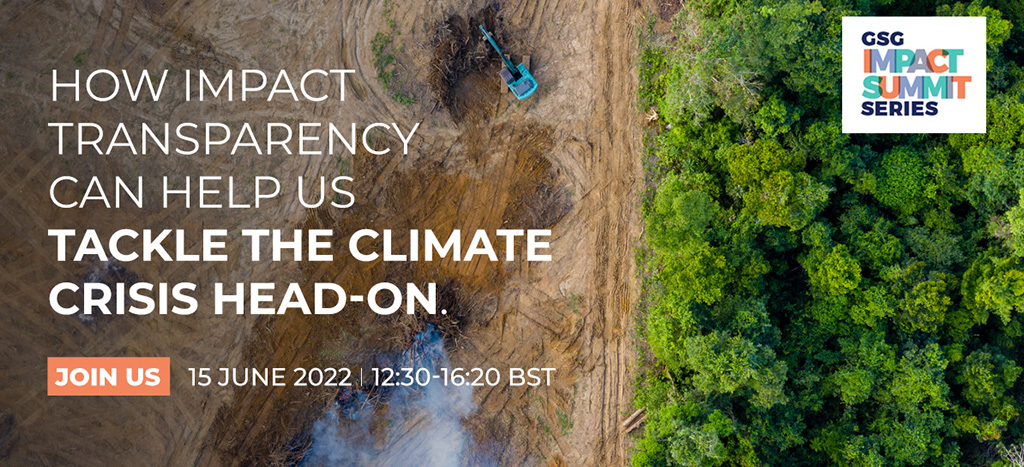
On Wednesday, June 15, the Global Steering Group for Impact Investment (GSG) will kick off its Impact Summit Series – an expansion of its annual Global Impact Summit – with Part 1: Financing a Better World Through Impact Transparency, taking place virtually from 12:30-16:20 BST.
As the world faces an ever more urgent climate crisis, global harmonised standards and regulatory reporting will pave the way for the public to have trust in the impact statements provided by investors and companies. And impact valuation will show where our impact efforts can be deployed best, for the benefit of all people and our planet. The three-part Impact Summit Series will convene impact leaders from around the world to discuss, debate, and share insights about the future of finance, and explore how impact transparency is crucial for our shared future.
Part 1: Financing a Better World Through Impact Transparency will focus on the role of regulators, ongoing developments on impact valuation and current efforts to implement this agenda globally, with contributions from impact leaders, practitioners and National Advisory Board (NAB) voices from around the world.
Speakers will include:
- Sir Ronald Cohen, Chairman, GSG
- Saori Dubourg, Member of the Board of Executive Directors of BASF
- Emmanuel Faber, Chair of the International Sustainability Standards Board
- Roger Ferguson, former Vice Chair of the U.S. Federal Reserve
- Gonzalo Gortázar, CEO of CaixaBank
- Jingdong Hua, former Vice President of the World Bank
- Nick Hurd, Chair of the G7 Impact Taskforce and former UK Government Minister
- Karen Karniol-Tambour, Co-Chief Investment Officer for Sustainability at Bridgewater
- Douglas L. Peterson, President and CEO of S&P Global
The full agenda for Part 1 can be viewed here. More information about the Impact Summit Series can be found here.
Accredited journalists can register to join Part 1 of the GSG Impact Summit Series here. Please select ticket PART 1: GENERAL PASS and use code MEDIA2022.
Dates and further information about the upcoming events in the Impact Summit Series are below.
22 September, 12:00-15:00 BST
Part 2: Boosting Capital Flows in Emerging Markets
In the second part of the Series, we explore the barriers to investment in the SDGs and provide concrete solutions, presented by asset owners, asset managers and other leaders already implementing them.
22 November, 12:00-15:00 GMT
Part 3: New Frontiers of the Impact Revolution, Townhall Meeting led by Sir Ronald Cohen
In the final part of the Series, Sir Ronald Cohen will lead a townhall meeting where we discuss boosting impact capital flows and debate how best to bring about full impact transparency for investors and businesses. We will look back at the progress made in implementing the G7 Impact Taskforce’s recommendations and the way forward in overcoming the challenges ahead.
ENDS//
Notes to editors
For media enquiries, please contact:
Lynn Nicholson, Chief Communications Officer, The Global Steering Group for Impact Investment – lynn.nicholson@gsgii.org
Mobile: +32 494 813 837
About the Global Steering Group for Impact Investment (GSG)
The Global Steering Group for Impact Investment (GSG) is an independent global steering group promoting sustainable development and advancing education in impact investment. The GSG was established in 2015 as the successor to, and incorporating the work of, the Social Impact Investment Taskforce established under the UK’s presidency of the G8. The GSG’s National Advisory Boards (NABs) currently cover 35 countries. The GSG brings together leaders from finance, business, philanthropy and governments to drive a shift towards impact economies. For more information visit www.gsgii.org and follow the GSG on Twitter and LinkedIn.

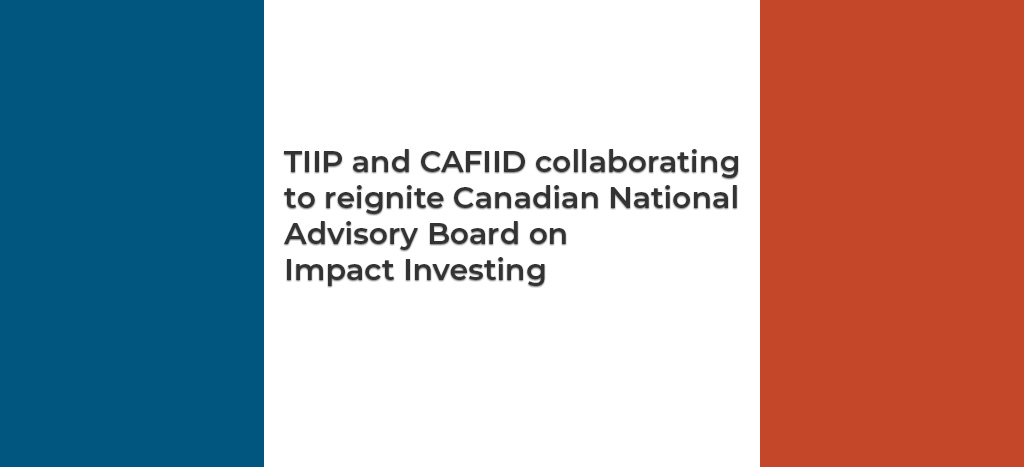

LONDON – The Global Steering Group for Impact Investment (GSG) is delighted to welcome Turkiye’s Impact Investing Advisory Board (EYDK) into the global National Advisory Board (NAB) family. The NAB is working on bring impact investing into the mainstream in Turkiye and integrating the country’s emerging impact ecosystem with the global impact community.
EYDK (www.eydk.org) brings together 38 leading public, private, and non-profit sector institutions across Turkiye. Its core aim is to advocate and map the national impact investing field. It is focused on building local, regional and international partnerships, while gathering and sharing impact information and raising awareness through initiatives including promotion and education.
GSG CEO Cliff Prior said: “We are delighted to welcome the Turkiye National Advisory Board into our growing impact community. This is a crucial time in the fight against climate change and global social challenges. EYDK will be a strong participant in the rapid development of a new investment future with impact transparency, and will help with the mobilisation of capital to places which need it most.“
EYDK President Safak Muderrisgil commented: “The readiness and motivation of the key stakeholders have accelerated Turkey’s involvement in the global impact economy in this historic turning point and EYDK is accordingly working towards nurturing the local ecosystem.”
The Turkiye NAB joins the GSG’s growing National and Regional Advisory Board network which covers 35 countries via 30 separate bodies. NABs support the GSG’s aim to catalyse impact investment and entrepreneurship to benefit people and the planet. Turkiye follows Nigerian NAB, which joined the community in December 2021.
A further 30 NABs are currently under development, many in lower and lower-middle-income countries around the world, underlining the growing reach of impact investing and the groundswell for investment made with positive environmental and social objectives at its heart.
ENDS//
Notes to editors
Contact for media enquiries
Lynn Nicholson, lynn.nicholson@gsgii.org, Tel.: +32 494 813 837
About the Global Steering Group for Impact Investment (GSG)
The Global Steering Group for Impact Investment (GSG) is an independent global steering group promoting sustainable development and advancing education in impact investment. The GSG was established in 2015 as the successor to, and incorporating the work of, the Social Impact Investment Taskforce established under the UK’s presidency of the G8. The GSG’s National Advisory Boards (NABs) currently cover 35 countries. The GSG brings together leaders from finance, business, philanthropy and governments to drive a shift towards impact economies. For more information visit www.gsgii.org and follow the GSG on Twitter and LinkedIn.
About Impact Investing
Impact investments are investments made with an explicit intention to generate positive, measurable social and environmental impact alongside a financial return. Impact investment optimises risk, return and impact to benefit people and the planet.

